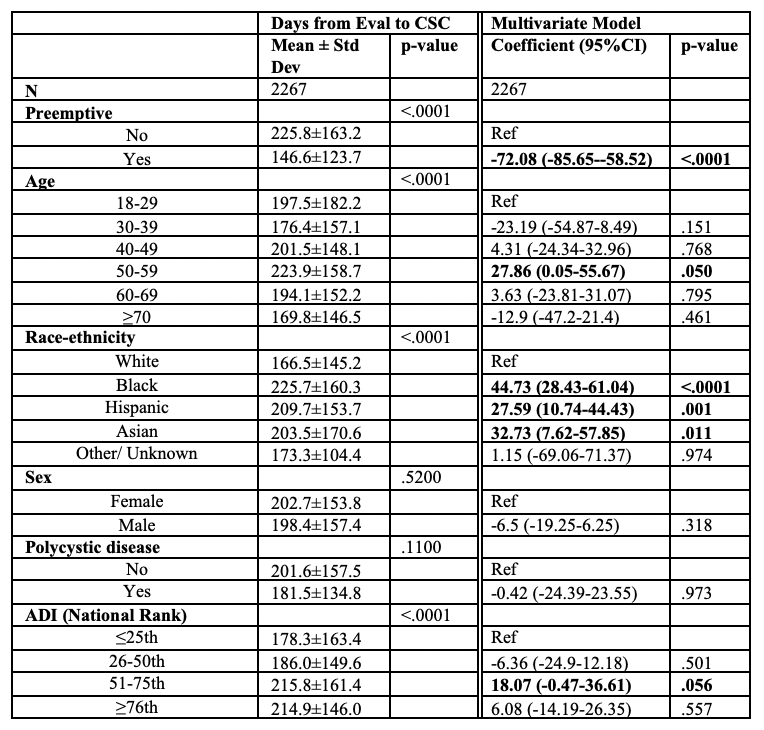A More Equitable Transplant Evaluation: What Patient-Level Factors Impact Time to Kidney Transplant Evaluation Completion?
Houston Methodist, Houston, TX
Meeting: 2022 American Transplant Congress
Abstract number: 1732
Keywords: Kidney, Kidney transplantation
Topic: Clinical Science » Kidney » 50 - Health Equity and Access
Session Information
Session Time: 7:00pm-8:00pm
 Presentation Time: 7:00pm-8:00pm
Presentation Time: 7:00pm-8:00pm
Location: Hynes Halls C & D
*Purpose: The kidney transplant evaluation process can take months or years to complete depending on patient health status and level of engagement. This study examines how demographic factors and socioeconomic status (SES) affect patient success in completing the pre-transplant workup process, specifically assessing total time from the initiation of the evaluation to presentation to the candidate selection committee (CSC).
*Methods: Requisite data for all kidney evaluation patients referred the transplant center from 6/1/2016 to 8/31/2021 were included; referrals after May 2021 were excluded to allow for a minimum of 3-month post-referral follow-up. Patients’ completion of the pre-transplant evaluation was the dependent variable of this analysis and was computed based on days between the evaluation and CSC data. We conducted regression analysis to evaluate the number of days from pre-transplant evaluation to MRB review, adjusting for demographic, SES, and clinical factors. SES was measured by quartile using the Area Deprivation Index (ADI) score, a proxy measure based on census cell block; scores are between 1-100, a score of one equates to the lowest level of disadvantage and high SES.
*Results: Sixty percent (2,267/3,757) of patients that begin the pre-transplant evaluation process completed the workup process and were presented to the candidate selection committee. The mean time to CSC was 200 days, 95% CI[194-207]. Controlling for all other covariates, preemptive status was associated with the largest decrease of wait time (72 days, p<.0001), while Black race was associated with the largest increase of wait time (44 days, p<.0001). Interestingly, all non-White races/ethnicities were significantly associated with increased time to CRC evaluation compared to white candidates. There was not a clear association between ADI quartile and evaluation time, although, patients in the 3rd quartile of the ADI were shown to require more time (18 days, p=0.056), but this fell short of statistical significance. *Selected results are included in the table.
*Conclusions: The total time from initiation of pre-transplant evaluation to its completion and subsequent review by the candidate selection committee presentation ranged widely. Preemptive candidates experienced the shortest time to CSC. All non-White candidates (i.e., Black, Hispanic, and Asian) demonstrated longer total workup times. Further study of means to stratify patients based on SES is timely in order to target social determinants of health and as a means to increase equity in evaluation and waitlisting times.
To cite this abstract in AMA style:
Menser T, Hobeika MJ, Hsu E, Moore LW, Waterman AD, Gaber AO, Knight RJ. A More Equitable Transplant Evaluation: What Patient-Level Factors Impact Time to Kidney Transplant Evaluation Completion? [abstract]. Am J Transplant. 2022; 22 (suppl 3). https://atcmeetingabstracts.com/abstract/a-more-equitable-transplant-evaluation-what-patient-level-factors-impact-time-to-kidney-transplant-evaluation-completion/. Accessed December 31, 2025.« Back to 2022 American Transplant Congress

